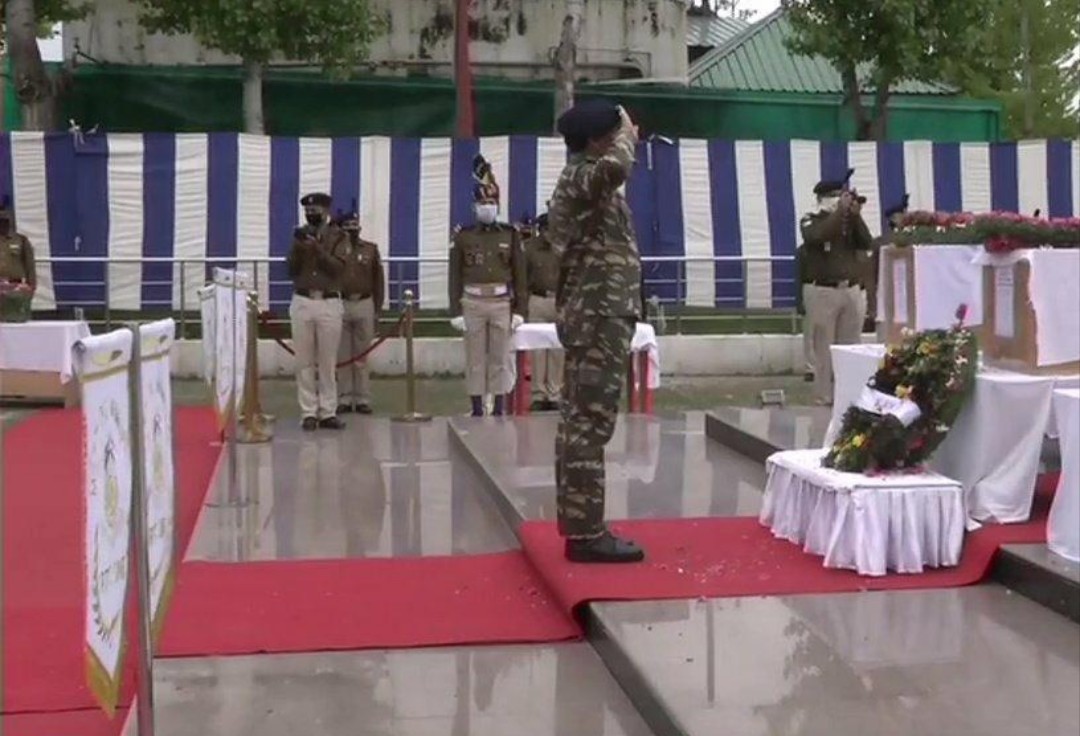Company Leader Nyima Tenzin, military sources say, was killed in an accidental mine blast during patrolling in Ladakh last week
BJP leader Ram Madhav pays tribute to Company Leader Nyima Tenzin. | Photo Credit: Special Arrangement
In a signal of what could be a major shift in the Government of India’s policy on publicly acknowledging the 58-year old “Special Frontier Force” (SFF), BJP general secretary Ram Madhav attended the funeral of Company Leader Nyima Tenzin who, military sources said, was killed in an accidental mine blast during patrolling in Ladakh last week.
The funeral of Tenzin, who belongs to the Choglamsar Tibetan refugee settlement outside Leh, was held on Monday morning. Soldiers wearing the SFF uniform gave the last salute, and Mr. Madhav laid a wreath. Chants of “Bharat Mata ki Jai” (Long live India) and “Tibet desh ki Jai” (Long live the Tibet nation), along with slogans of the “Vikas Regiment” (as the SFF’s seven battalions or “Establishment 2-2” are known), were raised after the bugle was played at the funeral.
“Attended the funeral of SFF Company Leader Nyima Tenzin, a Tibetan who laid down his life protecting our borders in Ladakh,” wrote Mr. Madhav in a tweet on Monday, adding, “Let the sacrifices of such valiant soldiers bring peace along the Indo-Tibetan border. That will be the real tribute to all martyrs.” The tweet was later deleted.
The Ministry of External Affairs (MEA) and the Ministry of Defence declined to comment on the funeral, and whether the public funeral of the Tibetan soldier denoted a departure from the past. A senior MEA official told The Hindu that Mr. Madhav “does not represent the government,” adding that as there had been “no official communication, only media reports” of the funeral, it did not signify a change in the government’s position.
Amid the stand-off
The presence of Mr. Madhav, a senior leader of the ruling party, at the funeral and the public acknowledgement of the SFF’s role in operations along the Line of Actual Control (LAC) was seen by many commentators as a strong message by New Delhi to Beijing, at a time the Indian and Chinese forces are engaged in a four and a half month stand-off along the LAC in Ladakh. India has traditionally recognised the Tibetan Autonomous Region (TAR) as a part of China, and although it is home to Tibetan leader the Dalai Lama and more than a lakh of Tibetan refugees, maintains that they do not organise or engage in any political activity.
“This is part of larger signalling to China — Tentative steps to convey we won’t be overly concerned about their sensitivities if they continue to ignore ours”, said Ashok Kantha, Director of the Institute of Chinese Studies (ICS) and former Ambassador to China.
Former Foreign Secretary Nirupama Rao said, “While mourning the unfortunate death of the brave Company leader Nyima Tenzin, it would have been wise to avoid unnecessary publicity about the SFF and their ostensible Tibet ‘connection’ in an atmosphere already charged along the LAC between India and China” This probably was the reason for the tweet being deleted later, she added.
Other former officials handling Tibetan issues said the government policy should not be changed frequently as this sent conflicting signals internationally as well as to the Tibetan community in India.
“This can be quite meaningless and even misleading if not backed by a firm commitment to a practical, robust and coordinated policy,” said Amitabh Mathur, who was the government’s advisor on Tibetan affairs, referring to the widely publicised funeral.
When Prime Minister Narendra Modi was sworn in in May 2014, the government invited the Sikyong or Prime Minister of the Tibetan “Government in Exile” Lobsang Sangay to the ceremony, and in 2016, the Dalai Lama was invited to a function in Rashtrapati Bhavan. However, in 2018, an MEA order reminded all public officials that it was against the government’s policy for them to take part in functions with the Tibetan community in India, and subsequently a number of celebrations marking the 60th anniversary of the Dalai Lama’s escape from Tibet to India, and an international parliamentary conference on Tibet were cancelled.
With inputs from The Hindu
(Except for the headline, this story has not been edited by Kashmir Today staff and is published from a syndicated feed.)

